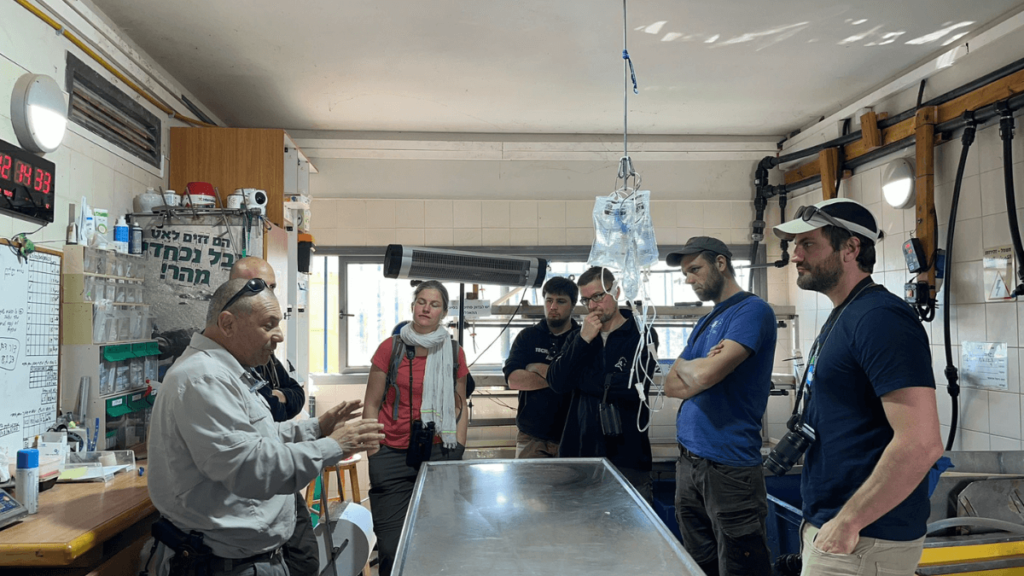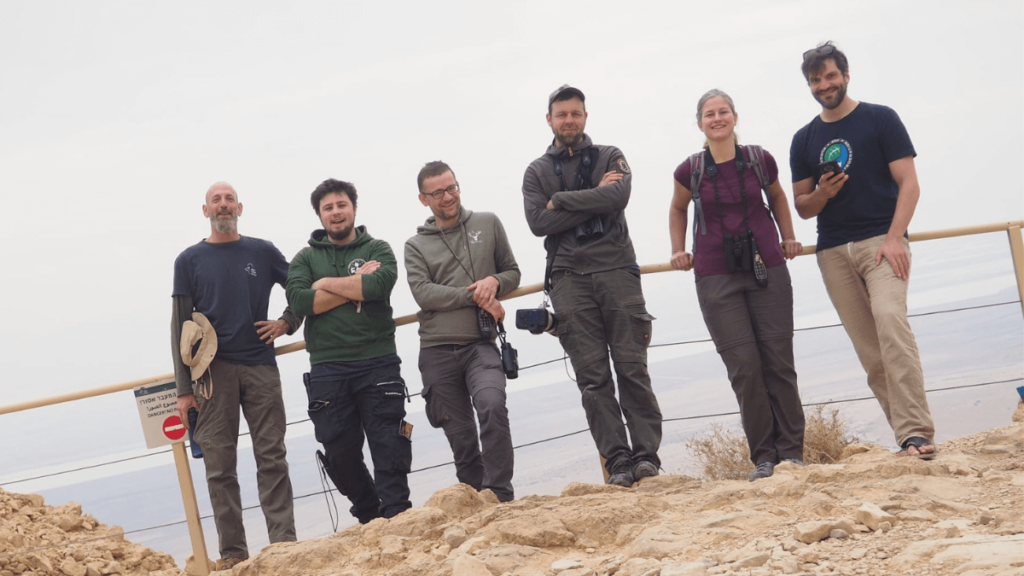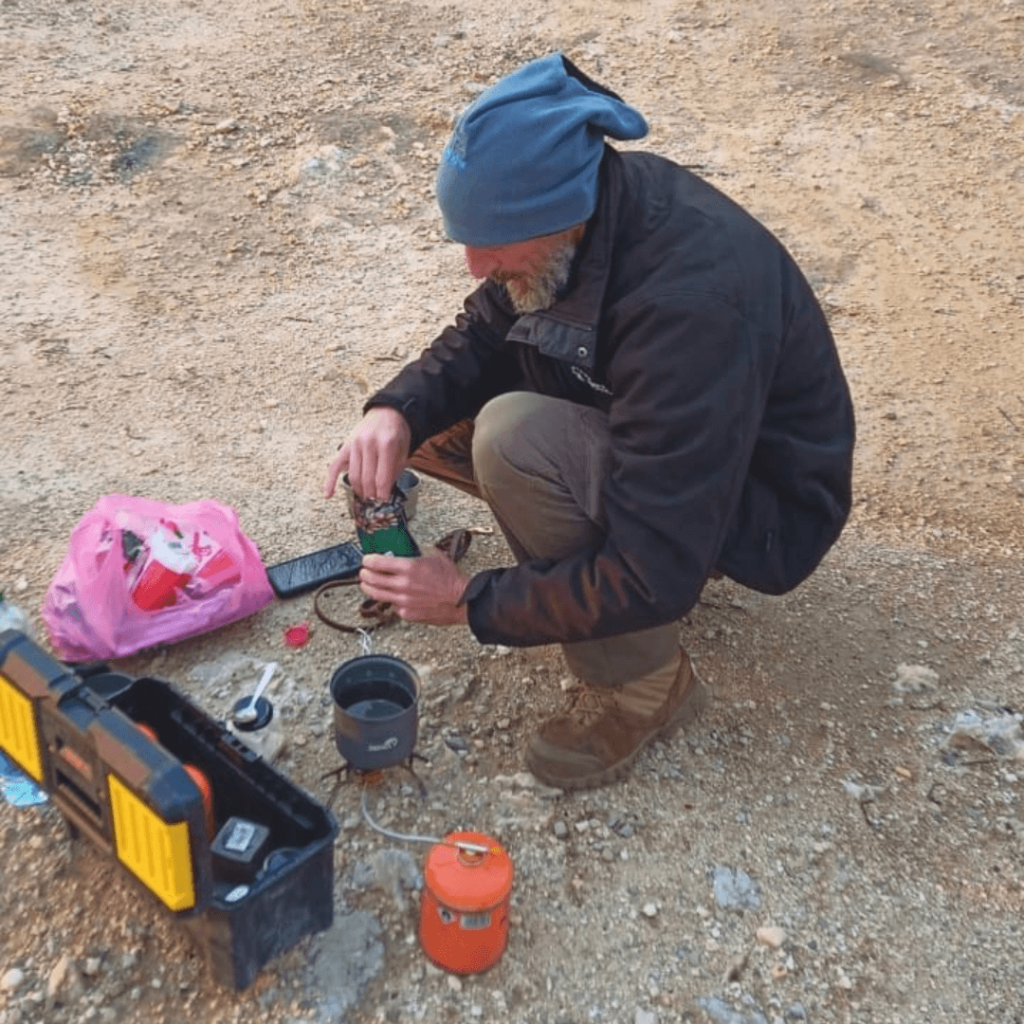It was a packed five days that rangers from Germany experienced during their visit to their Twinning partners in Israel last week. And it was even the second mutual visit of the Twinning partners after the pandemic, following the meeting in Brandenburg’s nature reserves National Park Lower Oder Valley, Biosphere Reserve Schorfheide-Chorin and three Nature Parks plus the Bavarian Forest National Park. What makes this Twinning partnership so successful and what do the German rangers take home for their work?
We spoke to Britta Schmidt, one of the participants and head of the rangers in Brandenburg, and Ilan Yeger, head of the anti-poaching unit from Israel Nature and Parks Authority (INPA) and one of the originators of the Twinning partnership.
Britta, you and other German rangers joined the Israeli rangers from INPA last week. What ranger topics did you touch and what did you see?
Britta Schmidt: We were a delegation of five, one ranger from the Bavarian Forest National Park, one volunteer ranger from Black Forest National Park, two ranger colleagues from Brandenburg and me. We touched topics like poaching, which is quite a big topic here in Israel, but also invasive species, species that had been extinct in Israel like the Oryx antelope and were reintroduced into nature or very rare species like gazelles or vultures, which need special attention. Not only did we talk to rangers, but also to ecologists for example. We were outside all the time and also did a night patrol with the anti-poaching unit, using techniques like night vision devices looking for poachers. Luckily there was no incident, because this is really nothing you want to get into. It’s quite a hard job to be a ranger in Israel.

“I personally experienced that the learnings in this twinning partnership are not only practical but also emotional learnings. And maybe they are even more important for both sides.”
Britta Schmidt, head of rangers in Brandenburg
Can you remember any special highlights, something that was particularly interesting for you to learn?
Britta: The highlights for me were the people here in Israel. And of course nature is amazing. We went from Central Israel down to the desert and to the Red Sea. There were so many things we saw and so many people we met, who are doing their job because they are in love with nature. Rangers in Israel have family, children, but still they are going out at night without knowing what’s going to happen. Luckily, we don’t have that except for incidents with people being upset from the pandemic situation. But it’s on another level. So we learned a lot about the motivation in Israel and what rangers invest here to save Gazella gazella for example. Another thing we could actually see is the natural connection between Germany and Israel through bird migration. This clearly shows us that we need to work together closely, because birds don’t care about borders.
Ilan, what did you learn from your guests?
Ilan Yeger: We learned to see what we do through their eyes. For us our lifestyle and kind of working 24 hours 365 days is normal. But from their perspective we realise that we do good things. All the time we criticise ourselves to do better and work harder. So when our colleagues from outside compliment us, it gives us a lot of motivation. This is what all our rangers felt. Another thing we learnt is that it’s ok to put your mobile phone aside from time to time. And as part of the last delegation to Germany in July, I can tell you also that we learned about the very good system of hosting people in nature parks from our German colleagues. The visitor centers in Bavarian Forest National Park for example are amazing. I felt that somebody there was thinking about every step I made; every step had some meaning: geological, ecological, concerning animals. I hope we will have the same system here one day.
“Going all the way to Germany with our history and differences and realising that you share the same passion: I think this is the most important.”
Ilan Yeger, head of anti-poaching at INPA

What is it that makes your twinning partnership so important for Germany’s and Israel’s rangers?
Ilan: The Israeli rangers really want to be part of the program, many are on the waiting list to go to Germany. The program has changed many who have participated for the better. They came back changed from Germany and became better rangers. This is nothing you can achieve with any workshop. I’m not religious. But the twinning project is like a spiritual adventure. Going all the way to Germany with our history and differences and realising that you share the same passion: I think this is the most important.
Britta: The time we are spending together is really intense with a packed schedule from morning to night. This brings us close together. I also met many of the rangers the third time and can see the changes Ilan talked about. So I personally learned that the learnings in this twinning partnership are not only practical but also emotional learnings. And maybe they are even more important for both sides.
Nevertheless, let us return to the practical: Ilan, as an organiser, what topics did you want to show the German rangers?
Ilan: They should get a taste of everything …
Britta: … especially hummus …
Ilan: … yes, of course there was the food issue. But we had anti-poaching on the agenda, saving the lives of animals in special protected areas like Hai-Bar Carmel Nature Reserve or in a special hospital for turtles, the Israel Sea Turtle Rescue Center. I think seeing this amazing project to rescue sea turtles that were almost extinct was especially nice. Also we visited heritage sites like the UNESCO world heritage Masada or Khan Sha’ar HaGai and our marine unit. The German rangers met not only rangers, but ecological and archeological experts to understand the wide picture of the topics Israeli nature organisations are dealing with.




Your twinning partnership is very successful, it has existed since 2017 and even survived the pandemic. What would you recommend to other twinning partners who want to get the most out of their twinning?
Ilan: To have a successful program you need
- People from both countries who are dedicated to the program. You need at least one on each side willing to spend time on the project.
- BBB – this is the abbreviation for Spanish “bueno, bonito, barato” and means good, beautiful and cheap. I learned this from our friend and Spanish ranger Borja. You must make it cheap to convince your managers to approve it. Rangers don’t care where they sleep, because they know the next day will be an adventure. In Germany for example we slept in a hayloft. We loved it and I’m sure it was not expensive.
Britta: You really need people going for it, organising it not just once but on an ongoing basis. They also need to put something personal into the program. Just as I am still a guest at Ilan’s home right now, who hosted us all. It must be clear that this is not a project you only do during your working hours. And you have to keep it alive, keep in touch, even between the visits. Then together you will develop a stable base and ideas for future twinning visits with interesting programs.
“Twinning changed my perspective”
Liron Tal has worked for INPA as a wildlife ranger for seven years. He recently upgraded to a K9 ranger, which means he works with detection dogs for conservation. Liron accompanied the German rangers on their twinning visit to Israel and was himself a guest of the twinning partners in Germany last July. Here he tells his ranger colleague and guest Britta Schmidt about his takeaways.

Britta: Liron, you have now been on the road with us for a week and were also part of the delegation of Israeli rangers who visited us in Germany last year. What were your highlights?
Liron: First it was beautiful and amazing to be in Germany and meet the ranger colleagues there. And for me it was even better when our German friends now came to Israel. My highlights were really meeting them, spending time together, sleeping on the floor. Being 24 hours together with rangers from a completely other part of the world, doing the same things we do was really amazing. It was a great week: We have been in the desert, up in the north. But most lovely and good for me was to meet the rangers and the people behind the rangers.

“Being 24 hours together with rangers from a completely other part of the world, doing the same things we do was really amazing.”
Liron Tal, K9 ranger at INPA
Nature and also ranger work is very different in Israel and Germany. Why do you think the Twinning partnership is nevertheless important and which topics do we share?
I don’t really know how to explain it. Maybe it’s chemistry or the German language that sounds quite familiar to some of us. But mainly I found out that German people are open, honest people that talk from their heart to share their thoughts and feelings. Maybe that’s the most important thing for us: to share information but also feelings about the things going on with nature around the world, for example. We have a lot in common. Our love and passion for nature is the heartbeat of the project. When I went to Germany, it really changed my perspective and life, I would say. And I am taking it with me as a really good influence in the present. Meeting people from a different part of the world with the same passion: That’s the best.
“It was great to share about volunteering to save sea turtles”
Sharon Golan Hershkovitz is the Director of Volunteering for the Israel Nature and Parks Authority and met the German rangers at the Sea Turtle Rescue Center – a project that involves many volunteers. Here she thanks the twinning partners for their visit and exchange. If you want to know what volunteering in Israel is like: Here you can learn more from Sharon about an exhibition on the topic.
editorial work for this
content is supported by


